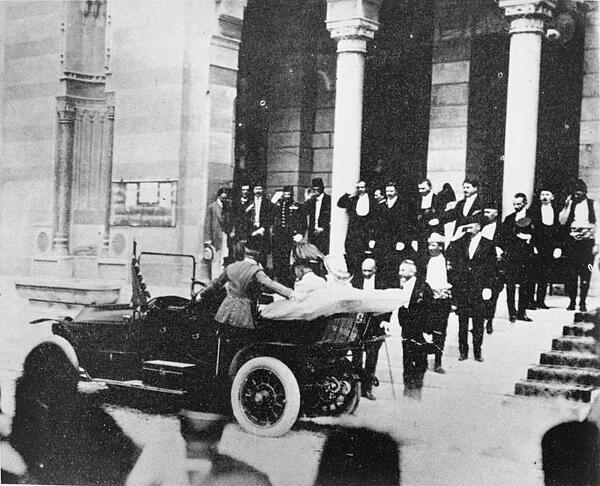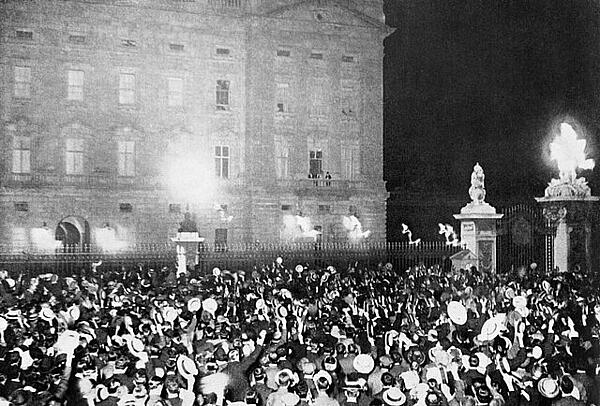1914 and World War One
1914 witnessed the events that triggered the outbreak of World War One, as well as the deadly trench warfare that followed.
28 June: Franz Ferdinand and his wife assassinated at Sarajevo.
5 July: Wilhelm II of Germany promised Austria-Hungary support if they took action against Serbia.
25 July: Austria-Hungary severed diplomatic ties with Serbia.
26 July: Austria-Hungary ordered a partial mobilisation against Serbia. Britain suggested a conference to settle the ‘Serbian Question’.
27 July: Germany refused the idea of a conference while Russia accepted it.
28 July: Austria-Hungary declared war on Serbia.
29 July: Germany refused to confirm adherence to Belgium’s neutrality. Russia asked Germany to put pressure on Austria-Hungary to show restraint while ordering a partial mobilisation herself.
30 July: Germany warned Russia to stop her partial mobilisation. Austro-Hungarian War Production Law introduced.
31 July: Russia ordered a full general mobilisation.
1 August: Germany declared war on Russia. Great Britain and France order a general mobilisation.
2 August: Germany attacked Luxemburg and demanded a right of transit through Belgium.
3 August: Germany declared war on France and having implemented the Schlieffen Plan, invaded Belgium.
4 August: Great Britain declared war on Germany. Germany declared war on Belgium. German troops attacked Liege.
6 August: Serbia declared war on Germany. Austria-Hungary declared war on Russia. Liege surrendered to the Germans. The British light cruiser ‘HMS Amphion’ was sunk by a mine in the Thames estuary.

7 August: First British troops landed in France.
8 August: Defence of the Realm Act introduced in Great Britain. France captured Mulhouse in Alsace. Department of War Raw Materials was established in Germany.
11 August: Germany recaptured Mulhouse and drove the French out of Alsace.
12 August: Great Britain and France declared war on Austria-Hungary.
17 August: The Russian 1st and 2nd armies advanced on East Prussia.
19 August: Serbian forces defeated the Austrians at Jadar River.
20 August: Brussels surrendered. Zeppelins flew over London and nearby ports.
21 August: Germany attacked Namur. Serbian troops forced Austrian troops out of Serbia.
22 August: A French offensive in the Ardennes was defeated. Hindenburg and Luderndorff arrived at Marienburg to take command of the Germany army on the Eastern Front.
23 August: The British Expeditionary Force started its retreat from Mons. Germany invaded France. The Austrian 1st Army engaged the Russian 4t Army at Krasnik.
25 August: The city of Lille was abandoned by the French. The Russian 4th Army was forced to retreat from Krasnik.
26 August: Start of the Battle of Tannenburg. The Russian 5th Army was defeated at Komarov.
28 August: First German attack on Verdun took place but was unsuccessful. The Battle of Heligoland Bight fought. The German Navy lost the cruisers ‘Mainz’, ‘Köln’ and ‘Ariadne’ – all three were sunk by the Royal Navy.
29 August: First checks to the German advance were made at St. Quentin and Guise. The Russian commander at Tannenburg, Samsonov, committed suicide. The Russian 3rd and 8th armies defeated the Austrians near Lemberg.
30 August: Paris bombed by aircraft of the German Air Service.
31 August: Battle of Tannenburg ended – 125,000 Russian troops were taken prisoner.
2 September: The French government secretly moved to Bordeaux.

3 September: Lemberg was occupied by the Russians. French aerial reconnaissance spotted gaps in the German advance towards the Marne and informed ground force commanders accordingly.
5 September: Start of the Battle of Ourcq between the French 6th Army and the German 1st.
6 September: First Battle of the Marne started.
7 September: German troops advanced on the Masurian Lakes.
8 September: Austria-Hungary invaded Serbia for the second time. “State of War” regulations introduced across the whole of France.
9 September: The advance of the French 5th Army and the BEF resulted in the Germans retreating.
12 September: The Germans re-crossed the River Aisne and set up well-defended positions.
14 September: Moltke was dismissed his command and replaced by Falkenhayn. This date marks the first time a radio was used in an aeroplane to direct artillery fire.
15 September: The first use of aerial photography by the Royal Flying Corps to assist ground forces.
22 September: Start of the Battle of Picardy. U-9 sunk three British cruisers off the Dutch coast. The Royal Flying Corps bombed Zeppelin sheds at Cologne and Düsseldorf.
26 September: Indian troops arrived at Marseilles.
27 September: Start of the Battle of Artois.
28 September: German artillery started to attack forts around Antwerp.
1 October: The French stopped a German breakthrough just to the east of Arras.
3 October: Belgium started to withdraw her forces from Antwerp.
4 October: German forces reached the Belgian coast. Start of the first combined German/Austrian operation in Poland.
10 October: Antwerp surrendered.
12 October: Lille occupied by German forces.
15 October: Battle for Warsaw started.
17 October: Russian forces saved Warsaw from capture.
18 October: First Battle of Ypres started.
20 October: First recorded sinking of a merchant ship by a U-boat when the ‘Glitra’ was sunk by U-17 off Norway.
29 October: Turkey entered the war on the side of Germany.
1 November: Start of the 3rd Austrian invasion of Serbia. The Battle of Coronel in the Pacific Ocean took place. ‘HMS Monmouth’ and ‘HMS good Hope’ were lost with no survivors.
4 November: Austrians defeated at Jaroslau.
11 November: Start of the second combined German/Austrian advance into Poland.
18 November: Start of the Battle of Lodz – the German advance into Poland was halted by fierce fighting.
22 November: First Battle of Ypres ended.
24 November: The German XXV Reserve Corps fought their way out of Lodz.
2 December: Austrians captured Belgrade.
6 December: Serbia defeated an Austria force at Kolubra River. Russian forces withdrew from Lodz.
8 December: Austria suffered a heavy defeat at a battle to the south of Belgrade. Battle of the Falkland Island took place – the German Navy suffered heavy losses with over 1,800 men killed.
9 December: Warsaw bombed by the German Air Service.
12 December: Start of a major Austrian counter-offensive against Serbia.
15 December: Serbia regained Belgrade. Austrian forces withdrew across their border.
16 December: Whitby, Scarborough and Hartlepool were bombarded by the German Navy.
24/25 December: Christmas truce on the frontline.
MLA Citation/Reference
"1914 and World War One". HistoryLearning.com. 2026. Web.
